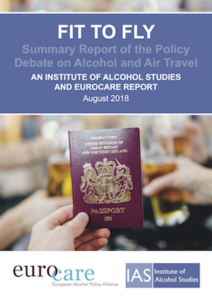View this report

The incidence of drunk and disruptive passengers on flights is increasing, having risen significantly since 2013. This puts the safety and welfare of passengers and cabin crews at risk, including children. Though perpetrated by a minority of passengers, the consequences of disruptive behaviour are far-reaching: 60% of adults in Great Britain who have travelled by air have encountered drunken passengers and 51% believe there is a serious problem with excessive alcohol consumption during air travel.
Although there are existing legal and voluntary measures in place to address the problem of drunk and disruptive passengers, we found that these alone are insufficient to address the issue and should be bolstered through additional measures.
IAS and the European Alcohol Policy Alliance (Eurocare) hosted a stakeholder event to investigate the nature of the problem and explore potential policy solutions. The event gathered 30 experts in the area of alcohol policy and aviation from across Europe. Speakers included a representative of Ryanair, the European Travel Retail Association, a legal expert and adviser to a UK House of Lords Committee and a representative of the Nordic Alcohol and Drug Policy Network (NordAN).
This report presents an outline of the current issues associated with alcohol and air travel, the legal framework and the policy recommendations arising from the event. Presentations and pictures from the event are available at the Eurocare website. It also includes public opinion polling data from a survey of adults (aged 18+) in Great Britain who travel by air.
A number of potential policy solutions were discussed. Of these, we have highlighted three key recommendations which have support from the public and stakeholders, would be workable and are likely to be effective:
- Better licensing regimes in airports, including, in the UK, the application of the Licensing Act so that premises after security are required to follow the same legislation as premises in the rest of the country. This would better regulate the sale of alcohol in airports and place a legal requirement on staff not to serve alcohol to people who are already intoxicated as in licensed premises on the high street. This measure received the support of 86% of GB adults who travelled by air and was opposed by only 4%, the highest level of support for any measure on which we polled the public. It is also supported by the UK House of Lords Licensing Act Committee and various local government bodies, the National Police Chiefs’ Council, Airlines UK and the Association of Licensed Multiple Retailers.
- Empowerment of local police forces at landing airports through the application of the Montreal Protocol. This would allow local police forces to prosecute disruptive passengers. Under the current system, it is the police in the country where the aircraft is registered who have the authority to act, meaning that the police in the landing airport can be powerless to act. This is supported by two of the main stakeholder representatives: the European Travel Retail Association, which represents airport retailers, and the International Air Transport Association, which represents airlines.
- Alcohol consumption at airports to be restricted to bars and restaurants, with alcohol bought at duty-free put in sealed containers and taken directly to the gate for passengers to pick up, or placed directly in the hold of the aircraft. This would prevent passengers drinking cheap duty-free alcohol in the airport. 7% of GB adults who drank alcohol in airports said that they drank alcohol from duty-free. Placing duty free in the hold, or in sealed containers, would also encourage passengers not to drink duty-free alcohol onboard the plane. The practice of sealed containers is already undertaken in some airports such as in South Africa, due to security concerns around liquids and gels, demonstrating that this measure would be workable in practice. Restricting the consumption of alcohol to bars and restaurants in the airport received the support of 74% of GB adults who travelled by air and was only opposed by 10% of GB adults. This was the second highest level of public support for measures on which we polled the public.
View this report
